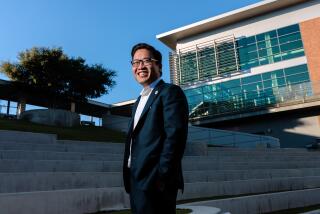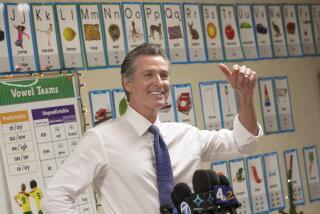Perfect Pair : 2 College-Bound Seniors Max the SAT--and They’re Not the First at Peninsula High to Do It
- Share via
David Chiang and Will Smit are perfect. Their SATs say so.
Only about a dozen of the 1.8 million students who take the college preparedness test every year score a perfect 1600. Even more remarkable, David and Will both attend Palos Verdes Peninsula High School.
The odds of getting every answer right are--well, let’s let Will figure it out. In his head.
“The percentage works out to one-fifteen hundredths of a percent, (which is) maybe seven ten-thousandths of a percent,” Will said. “I suppose that averages to 1,600 of the population of the U.S., roughly. It’s 45 quadrillion tons of the Earth’s weight. It’s two miles from here to the moon. I don’t know what other thing .0007 percent is comparable to. There just aren’t that many really useful analogies one can get out of it.”
Welcome to Will and David’s World. This is a place where teen-agers worship Beethoven, not Aerosmith, and books rule, rather than babes.
Will, 15, and David, 17, both learned how to read by the age of 3. Both showed an aptitude for arithmetic when many of their classmates were still learning to count. Both learned calculus in their freshman year of high school, and have been mainstays of Peninsula High’s math and Latin clubs.
The two boys are young for college-bound seniors. Will skipped two grades in grammar school; David skipped one. Their fathers are aerospace engineers, and both boys were using computers by their fifth birthdays.
But natural ability and upbringing are only two pieces of a large puzzle, especially considering that Will and David are only the most recent perfect scorers in the school district. Last year, Felix Wu scored 1600 on his SAT, and Robert Kaplan, a graduate of Palos Verdes High School in the 1970s, also got a perfect score.
“Here, the culture of the school (among) the kids is that academic excellence is . . . respected,” said Assistant Principal Alexis Sheehy. “It’s not considered nerdy to be a schoolboy or a schoolgirl.”
Both David, who will attend Harvard University, and Will, who will enroll at Caltech, downplay the significance of their SAT feat.
Neither spent more than a couple of weeks preparing for the 2 1/2-hour test, formally known as the Scholastic Aptitude Test, which is divided into verbal and mathematical sections. David reviewed vocabulary cards--”diaphanous” was the only word he studied for that appeared on the test--and Will took some practice exams.
David hoped for a score above 1500, but says he didn’t expect perfection. When his mother told him he hadn’t missed a single question, he thought she was kidding. “I didn’t believe her,” he said. “I thought she was playing a practical joke on me.”
Will, who routinely scored in the high 1500s on his practice exams, was shooting for 1600. He read the mailed announcement of his achievement with satisfaction. “I was happy,” he said. “I wasn’t amazed, but I was happy.”
The following question was not on the SAT:
One of these items has never appeared in the bedrooms of either Will or David. Which is it?
A) back issues of Scientific American
B) a map of the solar system
C) a skateboard
The right answer--was there any doubt?--is C.
David, claiming his room was too messy to admit visitors last week, would only provide a list of its contents.
Will, however, had an open-door policy. His is a spotless room more befitting a college student than a boy who likes to hold his door shut to keep out his 9-year-old sister, Betsy--and then suddenly lets go to see her fly.
Reference books, including more than a dozen on European political and military history, fill Will’s bookshelf, and his closet is adorned with maps of the world and solar system. A shelf above his desk neatly displays several dozen trophies, plaques and medallions--most of them earned in math contests.
The third youngest of four children, Will showed unusual abilities at a young age. When he was 4, he spent hours studying a children’s encyclopedia about marine life. His mother, Joan, tried to interest him in other books until she discovered he was using the sections on the measurements of whales to perform computations in his head.
With a mouth full of braces and peach fuzz on his upper lip, Will carries himself today with all the awkwardness one would expect from a lean and lanky 15-year-old who relaxes with video games.
His sister Jennifer, also graduating from high school this year, says he used to be “kind of arrogant” when she asked him for help with her homework. “But now he helps me, especially with my physics homework,” says Jennifer, 17. “He’s gotten more mature.”
Like their father, Geoffrey Smit, a mechanical engineer who emigrated from South Africa 20 years ago, Will tends to speak sparingly and in quiet tones. But when he does talk, he displays a precocity and intelligence that belie his years.
Consider his political leanings: “I would consider myself more of a Republican,” he said. “Generally, I’m more fiscally conservative. I’m not particularly fond of distributive programs. I would probably have voted for Bush.”
But that isn’t to say he is all books and seriousness. Will is also a member of the school’s track team. And teammates say he has a sense of humor that seems drawn from the likes of Monty Python.
Like the time he and other team members had to cut back weeds that had grown wild on part of their running course. While he and his teammates hacked away, Will spun a fantasy around an idea. Wouldn’t it be neat, he asked teammate Bizhan Khaleeli, 17, if they had an electromagnetic sword with the width of an atom? The sword, he suggested, would be light but strong and could cut down anything in its path.
“He’s constantly thinking in new directions about things--not necessarily inventions, but principles of physics or something that he could use in fantasy adventures,” Bizhan said.
David Chiang’s mind, friends say, is similarly inclined, though he talks so fast that people sometimes have trouble following his thoughts.
Like Will, David has a passion for video games and science fiction. But unlike his conservative companion, David’s politics run more toward the Democratic Party.
“I would have voted for Clinton,” David says. “I think he’s not doing so well because he broke all his promises, but if the economy shapes up, he’ll be OK.”
The youngest of two children, David also showed early signs of intelligence. By his fourth birthday, he had already taught himself to count to 20. And when other children in preschool were tearing up books, David was learning how to read.
His parents, Florence and John Chiang, who emigrated from Taiwan to the United States before their children were born, made a point of nurturing David’s curiosity. Not a week passed that they didn’t take him to the library, the zoo, a museum or a concert.
The exposure paid off. Today, David’s extracurricular life is filled with activities that include making home videos, songwriting, violin playing, computer programming, tutoring and serving as yearbook editor.
David’s favorite subjects, however, are math and physics--and the mantel in his parents’ living room is stacked with trophies. Like Will’s, most are from math competitions.
Although David is known as a curve breaker in some of his classes, friends say his accomplishments have yet to go to his head. In the yearbook room last week, photographer Kristine Chang, 17, tried to embarrass him by revealing that the two were “married” at a booth at the homecoming festival last year.
“He bribed me,” Kristine recalled. “He said ‘If you try out for math club, I’ll marry you.”’
But David, who can evoke a sense of authority even while slumping in his chair, was nonplussed. “She wanted a divorce because she wanted to marry someone else, but I wouldn’t let her,” he said.
His persistence and sense of humor rarely fail him. Last year, for instance, he spent months lobbying yearbook adviser Sandy Ching for the editor-in-chief’s position.
“He left little notes for me all around the classroom that said ‘David Chiang, editor-in-chief,’ ” she said. “In the mornings he would say, Good morning, Mrs. Ching--David Chiang, editor-in-chief--My you look lovely today.”
He got the job.
There is no shortage of such stories among Will and David’s Peninsula High teachers, all of whom forecast bright futures for the pair.
“They’re brilliant people,” said Latin teacher McNair Maxwell. “I wouldn’t be surprised to see them become newsmakers, to produce something important in math or science. If they have the discipline to go with it . . . they’re going to be able to do anything they want to do.”
Profiles in Smarts
David Chiang
Age: 17
College plans: Harvard University
Career goal: theoretical physics
Last book read: “Ender’s Game” by Orson Scott Card
Hobbies: violin, making home videos
Favorite cereal: Cheerios
William Smit
Age: 15
College plans: Caltech
Career goal: applied physics
Last book read: “Ringworld” by Larry Niven
Hobbies: running, computer games
Favorite cereal: Raisin Bran
More to Read
Get our high school sports newsletter
Prep Rally is devoted to the SoCal high school sports experience, bringing you scores, stories and a behind-the-scenes look at what makes prep sports so popular.
You may occasionally receive promotional content from the Los Angeles Times.






